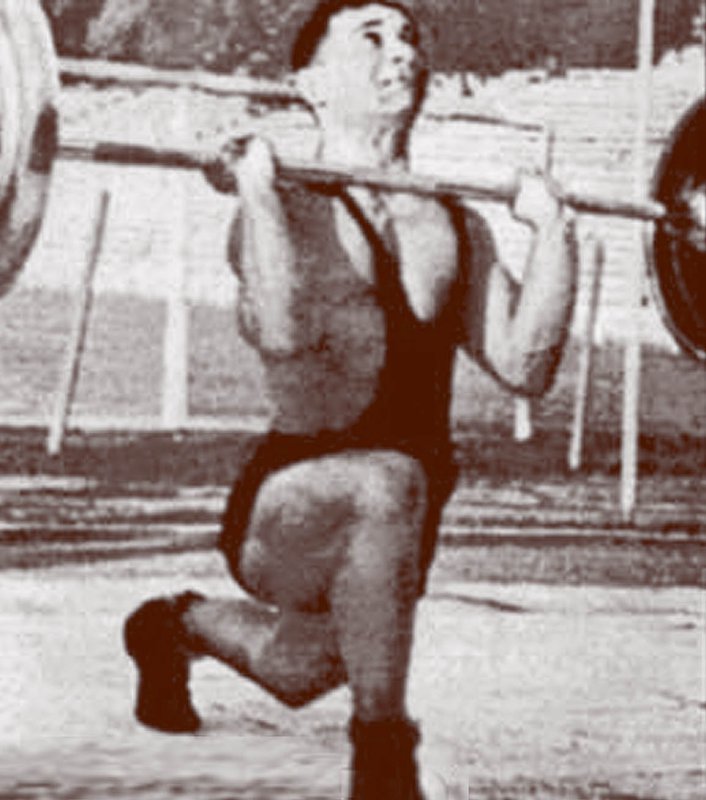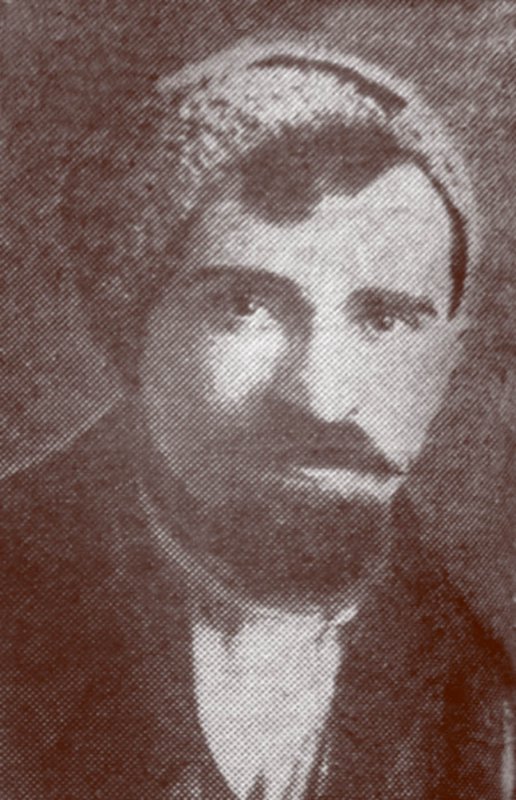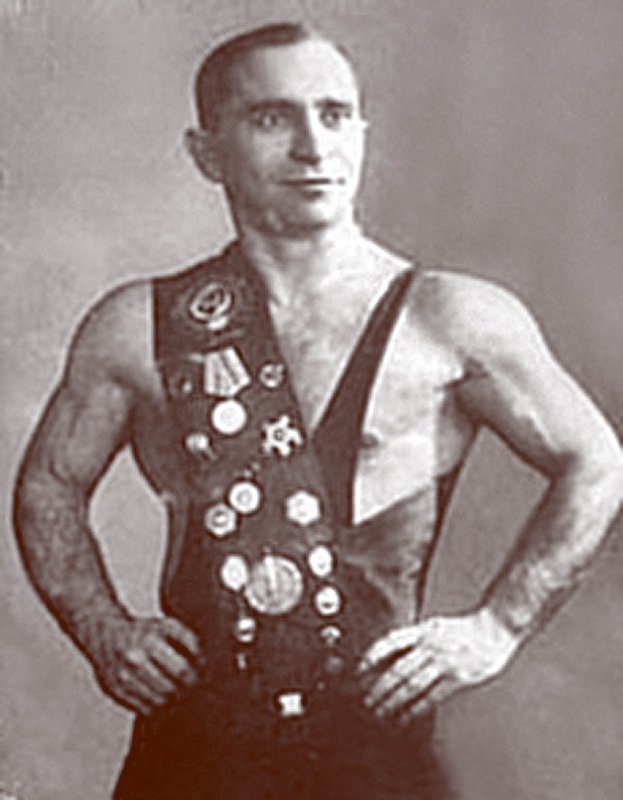Peace and war of Oleksandr Donskyi
Among the graduates or former students of Igor Sikorsky Kyiv Polytechnic Institute who have become outstanding athletes, football player Viktor Lobanovsky and gymnast Larysa Latynina are most often mentioned. However, there were others whose names once sounded in sports arenas all over the world. One of them is weightlifter Oleksandr Donsky i . Moreover, he became famous not only as an outstanding athlete who for more than fifteen (!) years had virtually no competitors on the weightlifting platforms of the former USSR and 24 (!) t imes w on the title of champion of Ukraine, but also as a partisan hero of World War II.
Oleksandr Donskyi was born in 1913 in Shenderivka, and as a child he moved with his parents to Kyiv. Here Oleksandr finished school, here he became interested in sports and began to do weightlifting. He was lucky: his first coach was a famous Ukrainian athlete, bronze and silver medalist of several championships of the USSR, the winner of the National Olympiad in 1922 Yakiv Shepelyanskyi. However, not everything depended on the coach, the most important role was played by natural physical characteristics, perseverance and, of course, character. Oleksandr Donskyi had all this. Although, he was a short man, weightlifting is one of those democratic kind of sports where athletes get equal opportunities and are divided into weight categories – from lightweight to super heavyweight.
 Sports success came to Donskyi rather quickly: at the age of twenty he already took second place in the USSR championship in the weight of “flies” – this way the lightest category (up to 54 kg) was officially called at that time.
Sports success came to Donskyi rather quickly: at the age of twenty he already took second place in the USSR championship in the weight of “flies” – this way the lightest category (up to 54 kg) was officially called at that time.
However, even though sport was important in his life at that time, it was not the most important thing for him. There were also other interest. Oleksandr entered Igor Sikorsky Kyiv Polytechnic Institute and persistently acquired the profession of radio engineer. In addition, he was fond of painting and, just as persistently as he did in life, studied the history of art and mastered various techniques. Moreover, he still helped friends too.
One of them for the whole life was another outstanding Ukrainian athlete - later a 14 times USSR champion and the author of many world records, the head coach of the USSR national weightlifting team Yakiv Kutsenko. Their friendship began when Donskyi was already a recognized master of the “iron game”, and Kutsenko, who was only two years younger than him, crossed the threshold of the weightlifting hall of the “Kharchovyk” Society for the first time. Yakiv Kutsenko described his impressions from the first meeting with Donskyi in his book of memoirs “In Life and Sports”: “And a small athlete with a perfect body structure comes up to the barbell. He pushes 105 kg. This number was not obvious to me at that time. However, judging from the impression that it made on the people present, I understood, it was a lot…”
For athletes weighing up to 54 kg, this is a lot even today. If we remember that modern methods of training and nutrition of weightlifters did not exist then; the conditions in which they trained and the sports equipments they worked with were much less perfect than they are today; and no one even had a clue about sports pharmacology - this result was really surprising.
Since 1933, Oleksandr Donskyi regularly participated in the championships of the USSR and became their winner: three times he got silver medals, twice he got bronze medals. He also helped his comrades during training. In any case, he played a very important role in both Yakiv Kutsenko’s sports and, probably, human destiny: they met not only in the gym, so their friendship, as Yakiv Hryhorovych wrote, “lasted for many years, until the death of this wonderful man.”
Who knows what results Oleksandr Donskyi would have shown at the USSR championship in 1941, if it had been held. However, the war began. Not only by his sports training and character, but also by all his talents and skills in general helped Donskyi to survive through the war with dignity.
 He went to the front lines from the very beginning of the war - in the worst months of 1941, when the Red Army retreated all the time, losing people every day and leaving their fellow citizens and their land to the enemy. Donskyi also felt the bitterness of the retreat deeply. In September, the unit where he served was among the last to cross to the left bank of Dnipro. It was not possible to unite with the main forces, which continued to retreat under the pressure of the Germans into Ukraine - so he, along with other fighters, was surrounded. Then there were desperate but futile attempts to escape from it, and, in the end, Oleksandr Donskyi was taken as a prisoner.
He went to the front lines from the very beginning of the war - in the worst months of 1941, when the Red Army retreated all the time, losing people every day and leaving their fellow citizens and their land to the enemy. Donskyi also felt the bitterness of the retreat deeply. In September, the unit where he served was among the last to cross to the left bank of Dnipro. It was not possible to unite with the main forces, which continued to retreat under the pressure of the Germans into Ukraine - so he, along with other fighters, was surrounded. Then there were desperate but futile attempts to escape from it, and, in the end, Oleksandr Donskyi was taken as a prisoner.
So he had to experience the horror of German POW camps.
During the first period of his captivity, Oleksandr became seriously ill and miraculously survived, because after a severe cold he also contracted dysentery. The Nazis, fearing epidemics, immediately shot such patients. However, comrades at the camp not only did not extradite him, but also took care of him. Perhaps years of training also helped: still strong, though exhausted by wandering organism overcame the disease.
Almost immediately after his recovery, he tried to escape from the train that had taken the prisoners somewhere to the west. However, in Zhytomyr region, the fugitives, who were extremely exhausted after wandering in the woods, came across feldjandarms. Interrogation, beatings, and again camp – Yemilchynskyi camp, which was organized on the place of the former GULAG camp.
Soon Donskyi managed to escape. He hid for some time, and later, with the help of locals, he established contact with the guerrillas. Then, on the instructions of the detachment command, he began to serve… in a village church! Of course, not immediately: in order not only to play the role of a priest, but also to really be able to soothe someone's aching soul, he had to learn from a real deacon who collaborated with the guerrillas and to work thoroughly on religious literature. Unexpectedly useful in it were Oleksandr’s artistic knowledge and skills: not only he restored some old icons, but he also painted several new ones. And most important, the church, where Oleksandr Donskyi served, also became a guerrilla shelter. There were meetings between the handlers and the underground members, there the information about German troops movements and the news about the actions of the occupiers from almost the whole region was gathered. Here they they kept propaganda materials and even weaponry. However, the police soon became interested in the activity of the foreign “preacher”, and by the order of the party association authority, he had to return to the forest immediately.
He fought in a detachment that was a part of the Zhytomyr Guierrilla Formation of Oleksandr Saburov. This detachment later became the basis of the newly formed guierrilla foormation under the leadership of Ivan Shitov, later known as the Ternopil Guierrilla Formation named after Mykyta Khrushchov.
Initially, Oleksandr Donskyi was assigned to the demolition team as a technical specialist. This required the knowledge gained at Igor Siikorsky Kyiv Polytechnic Institute. And yet - strength, endurance and the ability to withstand, that was brought up in him for many years of doing sports. He took part in several extremely dangerous sabotage operations on the railway.
About his combat work it is best written in the guerrilla description: “Comrade Donskyi Oleksandr Illich is in the guerrilla detachment since March 3rd 1943. During his stay in the rifle group, Comrade Donskyi participated in 23 combat and economic operations. Being in a sabotage group, Comrade Donskyi took part in the destruction of enemy echelons. On his personal account there were 9 enemy echelons derailed and two vehicles with manpower and equipment. In battles and in the sabotage Comrade Donskyi is brave and desperate. He was awarded the Order of the Red Star for military service and was presented for the award of the Order of the Patriotic War of the 1st degree, as well as the medal “To a Guierrilla of the Patriotic War of the 1st degree””.
The document also states that Donskyi performed combat tasks set before him despite his sick lungs and bronchi. He became ill during imprisonment at the camp and the desease did not let go until the last day of his life…
In July 1943, he was transferred to the editorial office of the quierrilla newspaper “In Name of the Motherland”, which needed an artist. Precisely speaking, the artist was needed not only for the newspaper, but also for the preparation of leaflets, which were published in the field printing house.
The case was extremely important. The fact is that the people among the quierrillas were very different, and the “people’s avengers” were not always as pure and courageous as Soviet propaganda later tried to portray them. This was explained by both objective (such as the need to procure food on their own, which often led to looting) and subjective (lack of proper control by commanders at various levels, demoralization of some fighters due to defeats of the first years of the war, the desire to “wait out” dangerous times far away from the enemy, drunkenness, etc.). “Shitovtsy” group was far from all right. Andriy Sukhykh, the researcher of quierrilla and rebel movements in Ukraine, claimes that “... most of the disciplinary violations among Ivan Shitov's fighters arose as a result of weak political and educational work in quierrilla detachments or it’s complete absence. In general, the discipline depended on the “strong arm” and image of the leader. Though, on the condition of the absence of these qualities, ordinary soldiers under the guise of combat missions solved their personal cases, which often turned into crimes against the locals…” So, the creation of the newspaper and the establishment of the publication of propaganda materials, obviously, had an aim not only to inform the locals about the real state of affairs on the other side of the front, but also to improve the educational work among personnel somehow.
As it turned out, working in the editorial office required not only the ability to draw, but also great ingenuity. Ivan Hrydchyn, the editor of the newspaper “In the Name of Motherland”, recalled: “We had difficulties in creation of a press machine. Well, we did invented it! The sewer pipe had a diameter of 100 mm and a length of 60 cm, we poured sand inside of it, while on the edges there were two round oak wedges, so the cast iron bars were attached too them for insulation. A pipe were covered with paper, then we covered it with an overcoat cloth, and then with mirror glass. And the assembler worked.”
From March 1943 to February 1944, 18 issues of the newspaper and dozens of leaflets were published. It is true that Oleksandr Donskyi worked in the editorial office for only four months, but his contribution to the work was very significant.
 After returning home, he immediately went to work according to his specialization. The country was being rebuilt, the industry was renovating, so engineers were vitally needed.
After returning home, he immediately went to work according to his specialization. The country was being rebuilt, the industry was renovating, so engineers were vitally needed.
Anyway, that was not enough for him. He was constatnly thinking of beginning to do sports as once. Moreover, his friends - those who survived to see the great Victory – were returning on the platform. Since 1943 the tournaments of the highest rank in the country - the championships of the USSR - have resumed. In 1945, 53 athletes took part in these competitions, in 1946 – 84 athletes, and in 1947 - already 150 athletes!
So Oleksandr Donskyi also began active training. And from 1945 he began to take part in national championships. Moreover, during the first year of his return to the big sport, he became a silver medalist of the USSR championship. The following year he was the third, and the year 1947 became truly “golden” for him - for the first time in his sports career he became the champion of the USSR in the lightest weight! The next year was just as happy as the previous one - another gold medal of the main championship of the country. The following year, he also became a world record holder in a jerk!
It was an official record, because in fact it was his second world record - the first, which he broke in 1937, was not officially accepted by the International Weightlifting Federation because of the simple reason that before World War II the USSR was not a part of it. The situation changed only in 1946, when on the eve of the World Championships in Paris, the Weightlifting Federation of the Soviet Union was admitted to the International Federation. At that championship, by the way, the athletes of the country that had just won the war immediately won second team place and updated several world records.
While in the summer of the following year, the European Championship was held in Helsinki, where the USSR team also performed for the first time. It also included Oleksandr Donskyi. He performed with dignity, taking the second step of the pedestal of honor and giving only to his comrade, three years younger than him, Ivan Azdarov. The following year, Donskyi took revenge on Azdarov, becoming ahead of him in the USSR championship by as much as fifteen kilograms. And for the next two years, he took second places in these tournaments, having turned older than the age that is considered critical for athletes in big sports.
However, the age did not interfere. The war was catching up. The disease, which in the guerrilla detachment he managed to overcome thanks to the accumulated long-term sports and healthy lifestyle reserves of the body, returned in peacetime. The bronchi and lungs failed. More and more often he suffered from terrible shortness of breath. "Pulling iron" was getting harder. But he did not give himself up: he continued to train and even perform his abilities publicly from time to time. Only when he turned over 40 year old, he decided it was time to stop. But he did not give up sports - he continued to train young athletes in the evenings. And day after day he worked at his design institute. Now he is no longer just an engineer, but a group leader, later a deputy head of the department.
However, the disease did not recede. He tried to fight. Yakiv Kutsenko, who last saw him before his trip to the next international tournament (he was already the head coach of the USSR national team at that time), recalled how he said goodbye and asked: “... can you bring me any medicine from there?”
Oleksandr Donskyi died on June 26th 1956. He was only 43 years old. His comrades-in-arms, institute friends, colleagues at work and, of course, almost all Kyiv weightlifters, both well-known and beginnersm came to say goodbye to him... And the memory of him is preserved in the stories about the amazing fate of the champion, which in four decades contained so many events and achievements that would be enough for the lives of several people…
